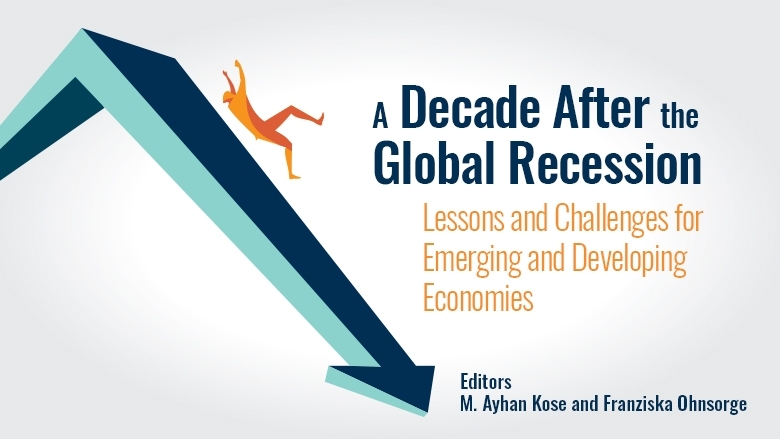Full report | Charts and data | Press release
This year marks the tenth anniversary of the 2009 global recession. Most emerging market and developing economies weathered the global recession relatively well, in part by using the sizeable fiscal and monetary policy ammunition accumulated during the prior years of strong growth. However, their growth prospects weakened since then, and many have less policy space.
A Decade After the Global Recession provides the first comprehensive stock-taking of the decade since the global recession from the perspective of emerging market and developing economies. Many of these economies have now become more vulnerable to economic shocks. The study discusses lessons from the global recession and policy options for these economies to strengthen growth and be prepared should another global downturn occur.
PRAISE FOR THE BOOK
"This excellent book extracts a comprehensive and compelling set of lessons from the experiences of emerging market and developing economies over an eventful decade. The book is ambitious in scope, rich in analytical content, and lucid in its content and structure. It seamlessly weaves together a vast amount of rigorously researched analytical material and valuable policy insights. It will serve as a very useful reference for academics, policymakers, and investors alike."
-- Eswar Prasad, Nandlal P. Tolani Senior Professor of Trade Policy and Professor of Economics, Cornell University
"The Great Recession was the most significant macroeconomic event since the Great Depression. Like the Great Depression, it had a deep effect on macroeconomic modeling and thinking. Recent efforts, however, have concentrated on advanced economies, and there is a risk that ideas that have been developed for the United States, Japan, or the euro area may end up being applied to countries with completely different macroeconomic environments. This important book focuses on emerging market and developing economies. It starts from the observation that these countries weathered the Great Recession relatively well and now have stronger policy frameworks. However, the book also shows that emerging and developing countries are now more exposed to the downside risks facing the global economy and highlights what policymakers can do to cope with adverse shocks. A must-read for all policymakers and researchers interested in emerging market and developing economies."
-- Ugo Panizza, Pictet Chair in Finance and Development, the Graduate Institute, Geneva; and Vice President, CEPR
“Why are many EMDEs less resilient to external shocks now than during the global recession of 2009? How can the disappointing path of output growth in these economies during the last decade be explained? What can policymakers do to prepare for an uncertain future? With strong analysis of the evidence, this book answers these three fundamental questions thoroughly and systematically; and it is done in a splendidly clear way. The book is a must-read for researchers, policymakers and practitioners around the globe seeking to understand the complex challenges facing EMDEs to achieve sustained economic growth in a highly uncertain international environment."
-- Liliana Rojas-Suarez, Senior Fellow and Director of the Latin America Initiative, Center for Global Development
"Just as the 2008 global financial crisis caught the world by surprise, the aftermath of the crisis has proved to be both puzzling and disappointing. This book meticulously documents the anemic recovery, especially among emerging market and developing economies. It also conveys a clear message: with fewer buffers than they had in 2008, these economies are particularly vulnerable to the next global downturn. Central bank governors and finance ministers—and the citizens to whom they are accountable—should read this book."
-- Shantayanan Devarajan, Professor of the Practice of International Development, Georgetown University
"The world has witnessed weakening global growth momentum with significant downside risks. This book provides succinct discussions of economic and financial developments that emerging market and developing economies have experienced since the 2009 global recession. It also suggests useful policies for these economies in an uncertain and risky global environment."
-- Jong-Wha Lee, Professor of Economics, Korea University
